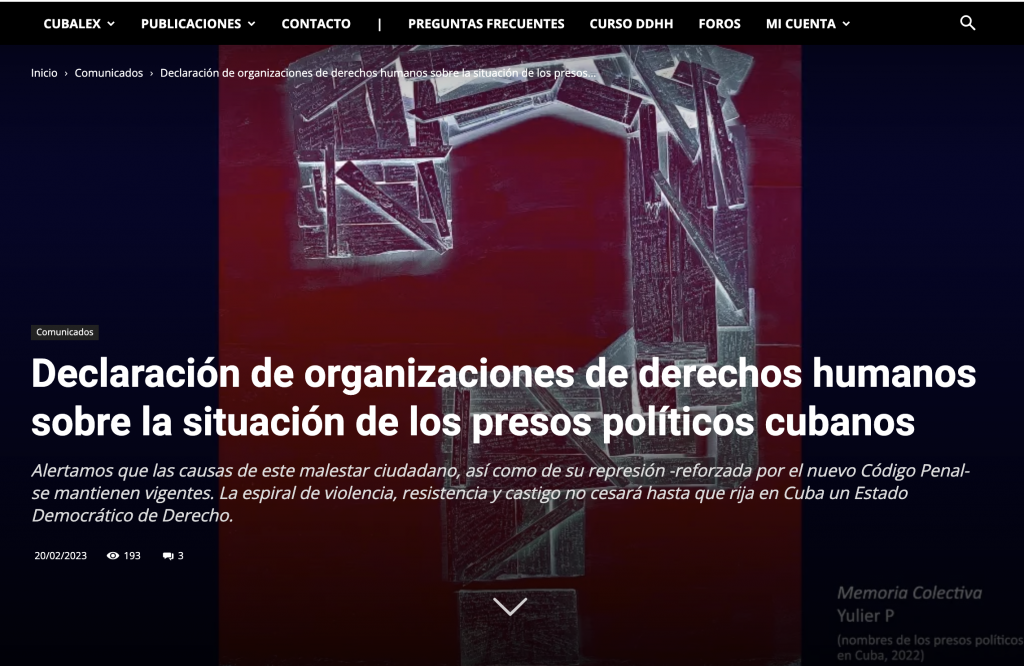
Cubalex, 20 February 2023 — The recent release of 222 political prisoners in Nicaragua and their immediate deportation to the United States, has raised the alarm among Cuban civil society regarding a similar “solution” to the current context on the Island. The protests of 2021 and 2022 resulted 768 protesters behind bars, a five-fold increase in the number of political prisoners since July 2021 (152).
The alarm is caused by conversations between the Cuban government and organizations such as the Catholic Church, the European Union and the United States Government, which have expresses positions in favor of the unconditional release of the political prisoners.
A precedent, two events in Cuba’s recent past: the release and exile in 2010 of most of the political prisoners of the Black Spring (2003), as part of a negotiation process to modify the Common Position of the European Union with regard to Cuba. Also in 2015, the release 53 political prisoners and subsequent exile for some as the only path to leave behind the pressures of State Security, as part of the negotiation process for reestablishing relations between Cuba and the United States.
Rappoteurs of the special proceedings of the UN Human Rights Council have expressed concern over the “forced exile” and threats of forced exile and have stated that “authorities would be directly involved in the physical expulsion of those affected”, or would have created a “markedly cohersive context of continuous threats, harassment and violations of human rights,” also against family members of those affected.
Although the Cuban case is referenced, in 2019, it is a valid warning for other scenarios. Sadly, it is a systematic practice of repressive regimes. The Nicaraguan political prisoners didn’t participate in the negotiation process either. They were not informed that the condition of their release was forcibly exiting their country.
Thus, the signing organizations:
1-Maintain that the deprivation of liberty as a form of punishment for exercising freedom of expression, assembly and association, and forced exile are reportable practices. The Cuban government uses them repeatedly to gain advantage in political, diplomatic and economic negotiations, as as a method of exerting social control and demobilizing civil society.
2-We consider, faced with an eventual negotiation between governments for the release of Cuban political prisoners, that it must be a process of humanitarian value. No citizen should be deprived of freedom for exercising their right to express themselves and protest. Their release, therefore, should be immediate.
3-We highlight that forced exit from the country as a condition for freeing or releasing political prisoners is a violation of the right to freedom of movement, as stated in the first paragraph of Article 12 of the Covenant on Civil and Political Rights. No person, much less those deprived of liberty under inhumane conditions in Cuban prisoners, can be forced to abandon the country as a condition to achieve their release or ultimate freedom. Whoever negotiates with the Cuban government should request guarantees that the person deprived of their liberty will decide on whether to leave the country without pressure from State Security. The pressure in these cases is a form of forced exile.
4-We believe that the participation of those deprived of liberty and their family members in the exit negotiations should be prioritized. The victims must be at the center of the negotiations. In addition certain minimum guarantees would be necessary for those who freely and voluntarily decide to leave the country, such as facilitating the processes for relocation and for obtain legal status and access to rehabilitation services.
5-We propose that prisoner releases and subsequent deportations that do not consider the mentioned guarantees for the victims be subject to questioning by human rights organizations and democratic governments, regardless of whether they are part of the negotiations. We oppose any laudatory pronouncements such as those made by the U.S. State Department, in which acts violating human rights are presented as “positive steps” for the consolidation of relations between countries and a path toward democracy.
The signing organizations have accompanied the Cuban government’s victims of repression, including those incarcerated as a result of the protests in the last two years. We welcome with hope the idea that they will be release, under any possible form. At the same time, we warn that the causes of this citizen unrest, as well as the repression–reinforced by the new Criminal Code — remain in effect. The spiral of violence, resistance and punishment will not cease until a Democratic State of Law governs Cuba, with full respect for human rights. A search for that Justice, in the present and in the future, calls to us and unites us.
On this 20th day of February, signed:

The declaration can be found here.
Translated by: Silvia Suárez
Note: TranslatingCuba has modified its practice of not including links to sources only available in Spanish, because the ease of instant translation through browsers now makes these sources easily readable.
